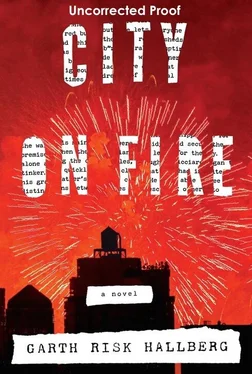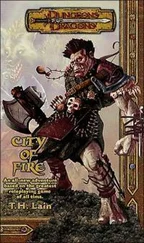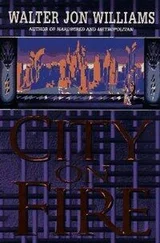“Who’s your friend here, Nicky? Do you really want to play corruptor of youth? Hey, if you know what’s good for you, kid, you should keep clear of these fuckups.”
“He does this all the time, he says. And you’re one to talk.”
“Besides,” Billy continued, “it seems like you’d want your wits about you, Nicky. From what I hear, you’re planning to go out in a real blaze of glory. Crude but effective, right?”
Nicky froze. It was like all the air had been sucked from the space between them. “Who told you that?”
“What do you mean, who told me? The ball drops in half an hour, and Bullet said you got a bunch of fireworks to shoot off at the end of the set. Some kind of big-ass bang.”
Even as he relaxed, Nicky’s armor seemed dented. “You know, Billy, we could still try to make the band thing work. It’s never too late to change.”
“Honestly, I’m just relieved to see Ex Nihilo’s for real; I had gotten a little suspicious it was some kind of ruse. Which reminds me … I brought along a belated Christmas gift.” Billy held out the record he’d been carrying. “Think of it as a peace offering of sorts. Deep stuff, but if you listen carefully, there’s a message.”
Charlie had an obscure impulse to tell Billy Three-Sticks not to give up or over so easily, but he kept his mouth shut, because whatever was being worked out here, it wasn’t about him. And Sam would have died if she’d known she was missing this meeting of the minds, Ex Post Facto, Ex Nihilo. Then he remembered: Quarter to twelve … Sam! He could see her, waiting by the subway exit in the slanting snow, looking left and right, alone. The little snowdrift before him gave a last, potent dazzle, but not even the promise of Nicky’s fireworks could match the purity of Charlie’s vision, which was the purity of dreams. “I just remembered,” he said. “I’ve got to go.” He pushed past the man in the doorway, whom a minute earlier he wouldn’t have dared to touch, but who seemed diminished by whatever he’d just ceded to his replacement. Only out in the corridor did Charlie look back, so that the last thing he remembered seeing before forging on through the maze of the basement and up the stairs was the two men, one burly and one small, inclined almost Talmudically over the sink, murmuring over what it contained.
THE BENCH HAD ALREADY ALL BUT DISAPPEAREDin the first five or ten minutes, its bottle-green slats gone white to match the white drifted underneath. Now, as the wind kicked up, tufts of her hood’s lining blew into her mouth, but she hardly noticed them, or the wind, or the snow, or even the fact that Charlie hadn’t shown — because he would show eventually, was the beauty and the tragedy of Charlie. Instead, her attention was on the fleecy globes of light out front of the apartment house down the street, and on the schmancy vestibule door. Every time it opened, she leaned forward a little … but it would only be some society couple lurching out through the storm, toward a gleaming black towncar that was even then, as if by secret prearrangement, gliding to the curb. Sam finished her cigarette and drew her coat tighter and squinted through a wreath of smoke. She’d made a resolution: tomorrow she would stop smoking, stop waking up with the wheezy pain in her lungs, stop forking over five bucks a week to evil multinationals. One last little cylinder of death remained, though, rolling around in its pack. She wondered how long she had left.
Making resolutions had been something she used to do with her mother. New Year’s was the one time of the year when Mom would bypass the bulgur wheat and wheat germ at the store in favor of the sweets Sam craved, and then they’d sit up together on the couch, dunking pizzelle in hot chocolate until sugar shock set in. Sam had been fat then. Mom had most likely been stoned. And what about Dad, where had he been? Work, probably. New Year’s was the second-biggest night of the year for fireworkers, and he hadn’t yet lost the contract to handle all the city’s displays, or settled into beery automythology with the magazine reporter who would become his Boswell. Or Groskoph, as the case may be. The television had been half commercials, but Mom left it on. Every shot of Guy Lombardo with his bow tie and his microphone the size of a seal club brought them closer to the big moment. There was a Timex-sponsored clock in the right-hand corner of the screen, and at T-minus thirty minutes, Mom would go get last year’s resolutions, which had gradually been forgotten among the florilegia magnetized to the fridge. Sam could still remember how her mom smelled as she returned to the couch, cocoa powder and marshmallow-melt, yes, but also an intricate woodland thing that spoke of California, from which she’d so improbably come.
What you did was, you read your resolutions out loud and put a check by the ones you’d managed to keep. The ones you’d broken became a starting point for your new list. Fifty percent was considered pretty good, unlike at school. As she looked back now, though, several things struck Sam. The first was that Mom had already harbored yearnings she must not have realized were legible there, in the resolutions that had been hanging in plain sight for the last 364 days, if only Dad would have thought to look. The second was the guilty way Mom had glanced at the streaks of powdered sugar on her daughter’s Dacron thighs as Sam read aloud her previous vow to lose twenty pounds. And finally — now that she had ten years of data on the two of them and an additional five on her own (for Sam was a manic documentarian, and had squirreled away all the lists) — there was this: how little difference it made. In the end, like every human project, these plans that on December 31 burned so brightly in the forebrain would gutter and come to grief. It was remarkable how many of her own resolutions Sam would forget in the course of the year. They would return to her at its end like sealed messages, bottles set adrift by some other self on the far shore of a wide sea.
For example, after swearing not to see Keith again (it was at the very top of her ’77 list) she found herself waiting for him. The glass door was like the shutter of a Coleman lantern: the square of yellow light on the sidewalk shone brighter when it was open, but this time it was only a doorman in a long coat and epaulets, ducking out for a smoke. As if in sympathy, and before she could stop herself, she lit her own last cigarette and watched the lonely figure, his face the color of a pecan shell, pace back and forth in a cloud of his own breath. Her nose-ring stung her nose. It was hard not to crumple the cigarette pack now that her fingers had lost feeling, but she was not— was not —cold. This had been a late addendum to her list: that just for the night, for the sake of feeling brave enough to do what she’d come here to do, she would not worry about the time or the temperature. The stubbornest person on earth, her father called her. He didn’t know the half. With those she loved — with Charlie, or with Dad himself — she could be, by her own standards, accommodating. She was most implacably stubborn when her opponent was herself. Because how many of her resolutions were really prohibitions? I will not x; I shall not y. She’d watched her mother closely, in those long-ago times when she’d been too little to know exactly what kinds of things one should promise oneself. She’d copied the syntax of Mom’s list, negation for negation, and had felt a surge of closeness every time Mom said, “Hey, that’s a good one.” Marrying Dad had itself been a kind of negation. The problem with Sam was that, right up to the deadline, midnight or whatever date she’d set for herself to give something up, she would double her indulgence, as if stockpiling. She’d given up sweets for Lent one year, and had made herself sick on Pez the night before Ash Wednesday, and so had missed them all the more. By midday Mass, she was headachey, salivating, and as soon as Easter came she wallowed in Cadbury eggs. The truth was, she didn’t in her heart of hearts want to give anything up.
Читать дальше












